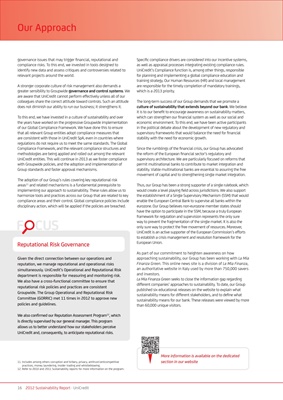
Our Approach
governance issues that may trigger financial, reputational and Specific compliance drivers are considered into our incentive systems,
compliance risks. To this end, we invested in tools designed to as well as appraisal processes integrating existing compliance rules.
identify new data and assess critiques and controversies related to UniCredit’s Compliance function is, among other things, responsible
relevant projects around the world. for planning and implementing a global compliance education and
training strategy. Our Human Resources (HR) and local management
A stronger corporate culture of risk management also demands a are responsible for the timely completion of mandatory trainings,
greater sensibility to Groupwide governance and control systems. We which is a 2013 priority.
are aware that UniCredit cannot perform effectively unless all of our
colleagues share the correct attitude toward controls. Such an attitude The long-term success of our Group demands that we promote a
does not diminish our ability to run our business; it strengthens it. culture of sustainability that extends beyond our bank. We believe
it is to our benefit to encourage awareness on sustainability matters,
To this end, we have invested in a culture of sustainability and over which can strengthen our financial system as well as our social and
the years have worked on the progressive Groupwide implementation economic environment. To this end, we have been active participants
of our Global Compliance Framework. We have done this to ensure in the political debate about the development of new regulatory and
that all relevant Group entities adopt compliance measures that supervisory frameworks that would balance the need for financial
are consistent with those in UniCredit SpA, even in countries where stability with the need for economic growth.
regulations do not require us to meet the same standards. The Global
Compliance Framework, and the relevant compliance structures and Since the rumblings of the financial crisis, our Group has advocated
methodologies are being applied and rolled out among the relevant the reform of the European financial sector’s regulatory and
UniCredit entities. This will continue in 2013 as we foster compliance supervisory architecture. We are particularly focused on reforms that
with Groupwide policies, and the adoption and implementation of permit multinational banks to contribute to market integration and
Group standards and faster approval mechanisms. stability. Viable multinational banks are essential to assuring the free
movement of capital and to strengthening single market integration.
The adoption of our Group’s rules covering key reputational risk
areas11 and related mechanisms is a fundamental prerequisite to Thus, our Group has been a strong supporter of a single rulebook, which
implementing our approach to sustainability. These rules allow us to would create a level playing field across jurisdictions. We also support
harmonize tools and practices across our Group that are related to key the establishment of a Single Supervisory Mechanism (SSM) that would
compliance areas and their control. Global compliance policies include enable the European Central Bank to supervise all banks within the
disciplinary action, which will be applied if the policies are breached. eurozone. Our Group believes non-eurozone member states should
have the option to participate in the SSM, because a truly European
framework for regulation and supervision represents the only sure
F CUS way to prevent the fragmentation of the single market. It is also the
only sure way to protect the free movement of resources. Moreover,
UniCredit is an active supporter of the European Commission’s efforts
to establish a crisis management and resolution framework for the
European Union.
Reputational Risk Governance
As part of our commitment to heighten awareness on how
Given the direct connection between our operations and approaching sustainability, our Group has been working with La Mia
reputation, we manage reputational and operational risks Finanza Green. This online news site is a division of La Mia Finanza,
simultaneously. UniCredit’s Operational and Reputational Risk an authoritative website in Italy used by more than 750,000 savers
department is responsible for measuring and monitoring risk. and investors.
We also have a cross-functional committee to ensure that La Mia Finanza Green seeks to close the information gap regarding
different companies’ approaches to sustainability. To date, our Group
reputational risk policies and practices are consistent
published six educational releases on the website to explain what
Groupwide. The Group Operational and Reputational Risk
sustainability means for different stakeholders, and to define what
Committee (GORRIC) met 11 times in 2012 to approve new sustainability means for our bank. These releases were viewed by more
policies and guidelines. than 60,000 unique visitors.
We also confirmed our Reputation Assessment Program12, which
is directly supervised by our general manager. This program
allows us to better understand how our stakeholders perceive
UniCredit and, consequently, to anticipate reputational risks.
More information is available on the dedicated
11. Includes among others corruption and bribery, privacy, antitrust/anticompetitive section in our website
practices, money laundering, insider trading and whistleblowing.
12. Refer to 2010 and 2011 Sustainability reports for more information on the program.
16 2012 Sustainability Report · UniCredit